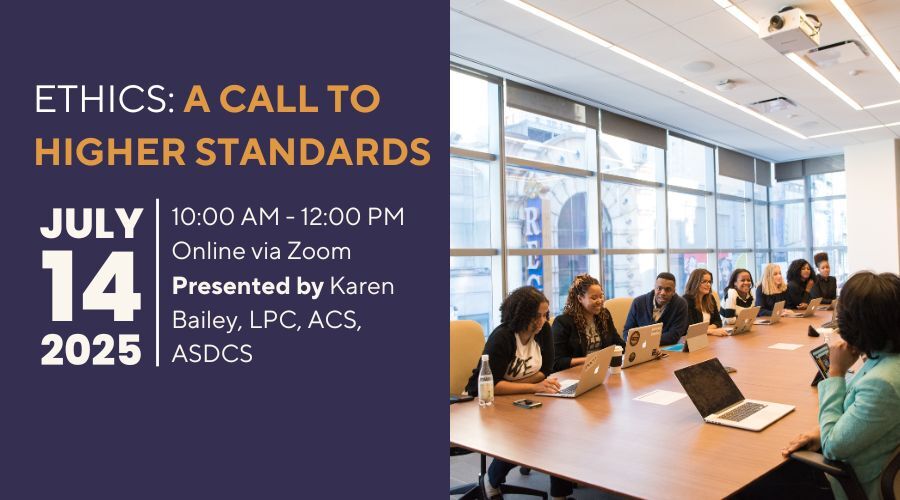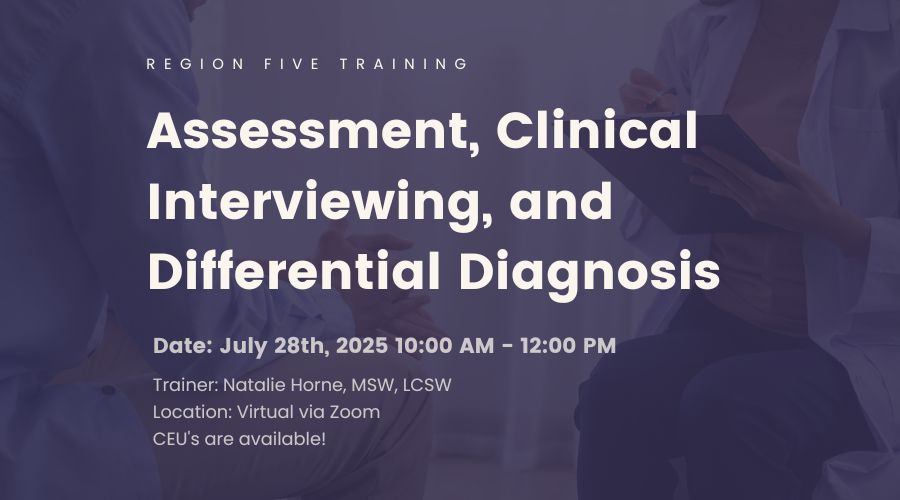Upcoming Region Five Training
July 2025
Ethics: A Call to Higher Standards

Location
- Online
- Zoom
Category
Working as a Mental Health Professional can be complicated especially when working with people!
The focus of this training is to discuss ethical issues that come up in everyday life so that you are better grounded on how to make ethical choices and decisions.
We will cover:
- – Ethics & Boundaries- How do ethical boundaries inform how we conduct ourselves with clients.
- – Agency & Autonomy – Recognizing client’s autonomy and respecting personal choices
- – Keeping yourself on the Ethical Track
- – Recognizing your own bias and issues that can get in the way of making ethical professional decisions.
CEUs are available!
Date: July 14th, 2025
Time: 10am-12pm
Location: Online
Trainer: Karen Bailey, LPC, ACS, ASDCS
 Karen Bailey is a Licensed Professional Counselor, Approved Clinical Supervisor and Autism Spectrum Disorder Clinical Specialist. Karen Bailey has worked in the field for 28 years.
Karen Bailey is a Licensed Professional Counselor, Approved Clinical Supervisor and Autism Spectrum Disorder Clinical Specialist. Karen Bailey has worked in the field for 28 years.
She specializes in Autism, Neurodiversity, Intellectual Disabilities, Depression, Anxiety, Trauma recovery, Grief and Loss, Developmental issues, and Women issues. Karen Bailey currently works as the Manager of Autism ID Treatment Services at Western Tidewater Community Services Board.
Register Here
Assessment, Clinical Interviewing, and Differential Diagnosis

Location
- Online
- Zoom
Category
Information gathering and rapport building are the cornerstone of the relationships we develop with the clients we partner with on a daily basis. Assessment, clinical interviewing and differential diagnosis are key components of this process.
This training aims to provide guidance and support in reviewing these skills as well as allowing practical practice on a group level. Please join this training if you wish to review and expand what you know in the areas listed above.
Main Areas of Focus:
– Assessment Process
– Building Rapport
– Clinical Interviewing
– Common Diagnoses
– Differential Diagnoses and Practice
CEU’s are available!
Date: July 28th, 2025 10:00 AM – 12:00 PM
Location: Virtual via Zoom
Trainer: Natalie Horne, MSW, LCSW
 Natalie Horne is a licensed clinical social worker (LCSW) who received her Master’s of Social Work from The University of Pennsylvania. She has five years of experience in the mental health field with an emphasis on children and families. She has previous experience as a therapist in eating disorder partial hospitalization and intensive outpatient as well as a school counselor in a special education private day school.
Natalie Horne is a licensed clinical social worker (LCSW) who received her Master’s of Social Work from The University of Pennsylvania. She has five years of experience in the mental health field with an emphasis on children and families. She has previous experience as a therapist in eating disorder partial hospitalization and intensive outpatient as well as a school counselor in a special education private day school.
She has worked in in the Same Day Access department of the Western Tidewater CSB for the last 2 years, completing clinical assessments, and has a passion for quickly connecting clients to the services they need while providing them education on treatment options and their diagnoses.

